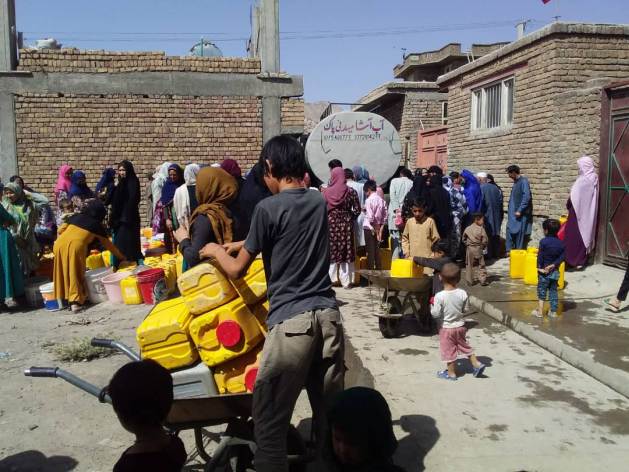Kabul Residents Endure Hours-Long Queues in Severe Water Crisis

Dec 14 (IPS) - The author is an Afghanistan-based female journalist, trained with Finnish support before the Taliban take-over. Her identity is withheld for security reasonsAccording to United Nations statistics, nearly 80 percent of Afghan families lack access to sufficient water for their daily needs. Afghanistan, a landlocked country with limited water resources, is grappling with an exacerbated drought fueled by climate change, affecting the entire region.
In the western parts of Kabul, residents must endure lengthy queues, waiting for hours to secure the water they need.
The situation has reached a critical point, exemplified by the district of Dasht-e-Barchi running out of water as temperatures rise. This crisis has persisted for months.
In the 13th district of Kabul city, the water company has suspended the water supply. Muhammad Ali and Juma, who have been living in the district for more than seven years, describe their plight as the worst they've experienced, emphasizing the absence of water and any communication from officials.
To obtain drinking water, residents must travel considerable distances, enduring hours of waiting only to bring home a few barrels. Families designate someone to stand in line constantly, yet they still experience several days and nights without water.
A private company that used to distribute water to people in exchange for money does not do it anymore. Residents say that there is no government water supply system in this area.
People can’t afford to dig their own wells. Therefore, they must wait for hours to get water from mosques and public distribution centers.
Groundwater levels in Kabul have dwindled significantly. In the Pole Khushk area, western Kabul, people wait from morning to evening for just one barrel of water, highlighting the severe impact of poverty and water scarcity on the city's residents.

The Ministry of Energy and Water has plans to manage groundwater. The head of water program coordination, Rafiullah Stanakzai, says that there are several ongoing projects: the Kabul-Panjshir water canal project as well as the Shah Tut and the Shah Arous projects that supply water to Kabul. The work on these projects will begin after the technical team has reviewed them.
Officials attribute the decline in groundwater levels to population growth and excessive groundwater usage, underscoring the urgency of resolving the water crisis.
The water crisis needs a quick resolution. The Taliban government lacks a comprehensive plan to address the population's needs for drinking water and essential necessities, casting a dark and hopeless shadow over the country plagued by drought.
A recent United Nations report highlights the gravity of the water crisis in Afghanistan:
- Around 8 out of every 10 Afghan people drink unsafe water.
- 93% of children in Afghanistan (15.6 million children) live in areas of high, or extremely high, water vulnerability.
- Nearly 4.2 million people practice open defecation.
- 5 out of every 10 Afghan people don’t have access to at least basic sanitation facilities.
- Over 6 out of every 10 Afghan people don’t have access to basic hygiene facilities.
- Around 94% of schools across Afghanistan lack access to basic handwashing facilities.
- Around 35% of healthcare facilities lack access to at least a basic drinking water supply.
© Inter Press Service (2023) — All Rights Reserved. Original source: Inter Press Service
Where next?
Browse related news topics:
Read the latest news stories:
- Energy Transfers Lawsuit Against Greenpeace Is an Attempt to Drain Our Resources and Silence Dissent Friday, April 04, 2025
- Global Disability Summit Galvanizes Education Support for Crisis-Impacted Children with Disabilities Thursday, April 03, 2025
- World Autism Awareness Day 2025: Sustainable Development Must Include Neurodivergent Perspectives Thursday, April 03, 2025
- Solar-Powered Spinning Machines Help Indian Women Save Time and Earn More Thursday, April 03, 2025
- DR Congo: Millions Facing Destitution as Violence Forces People to Flee Multiple Times Thursday, April 03, 2025
- ‘Every piece tells a story’: Bombs to beauty, from Gaza to Ukraine Thursday, April 03, 2025
- DR Congo: Armed violence displaces thousands as cholera outbreak worsens Thursday, April 03, 2025
- World News in Brief: Israeli military escalation in Syria, Nicaragua rights probe, South Sudan talks Thursday, April 03, 2025
- Gaza: UN rights chief calls for probe into killings of medical workers Thursday, April 03, 2025
- UN envoy urges international support for West Africa and the Sahel Thursday, April 03, 2025
Learn more about the related issues: